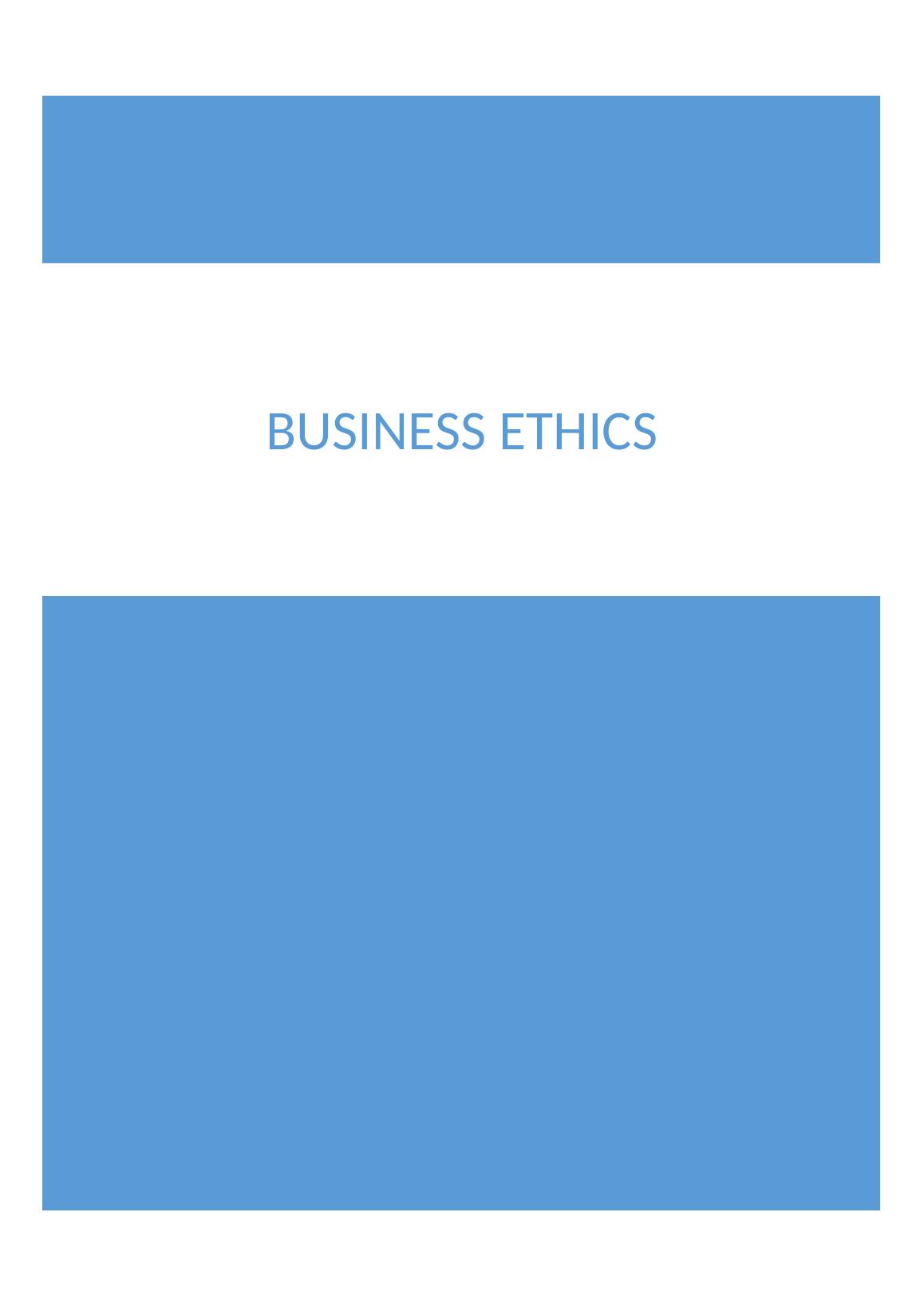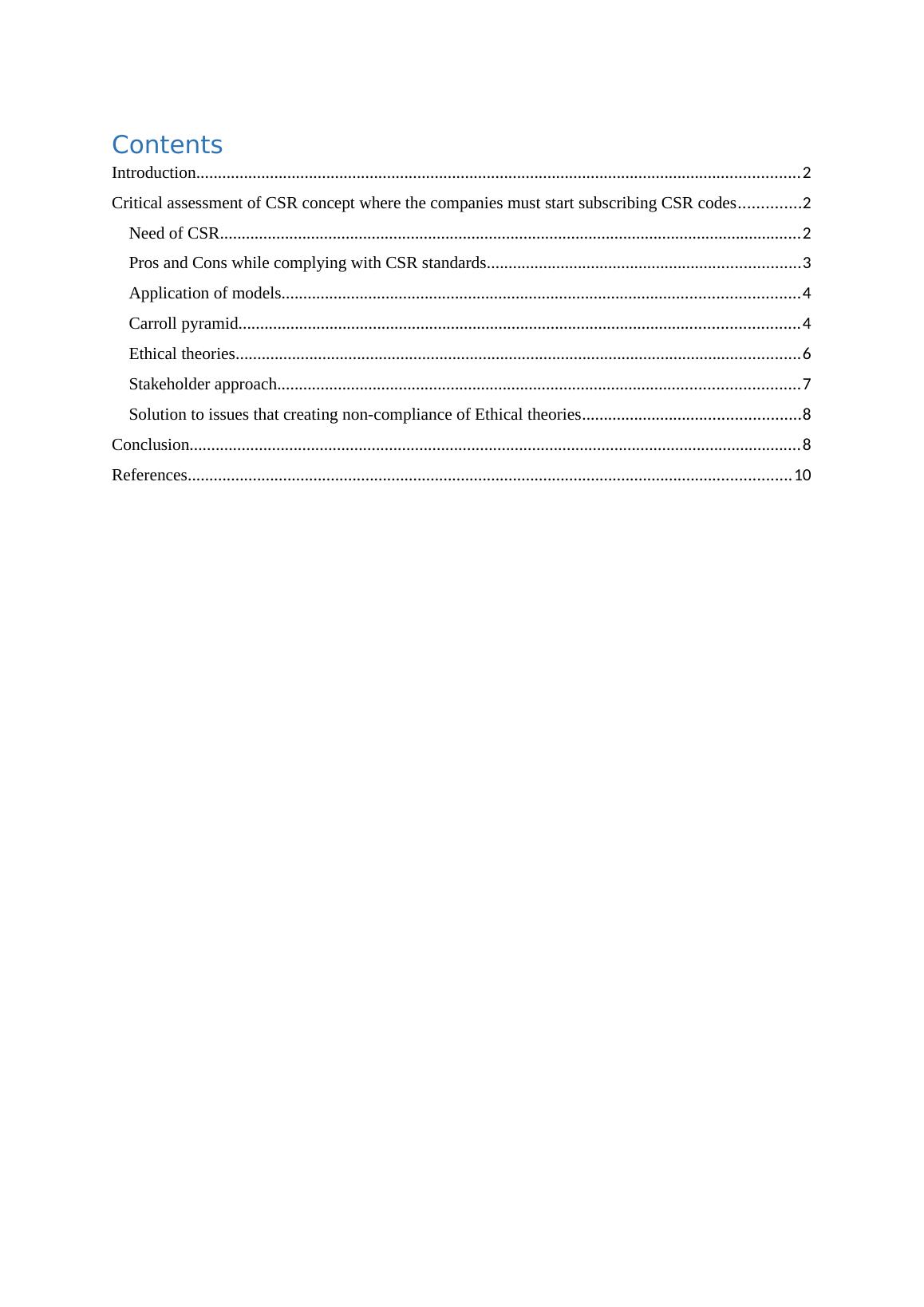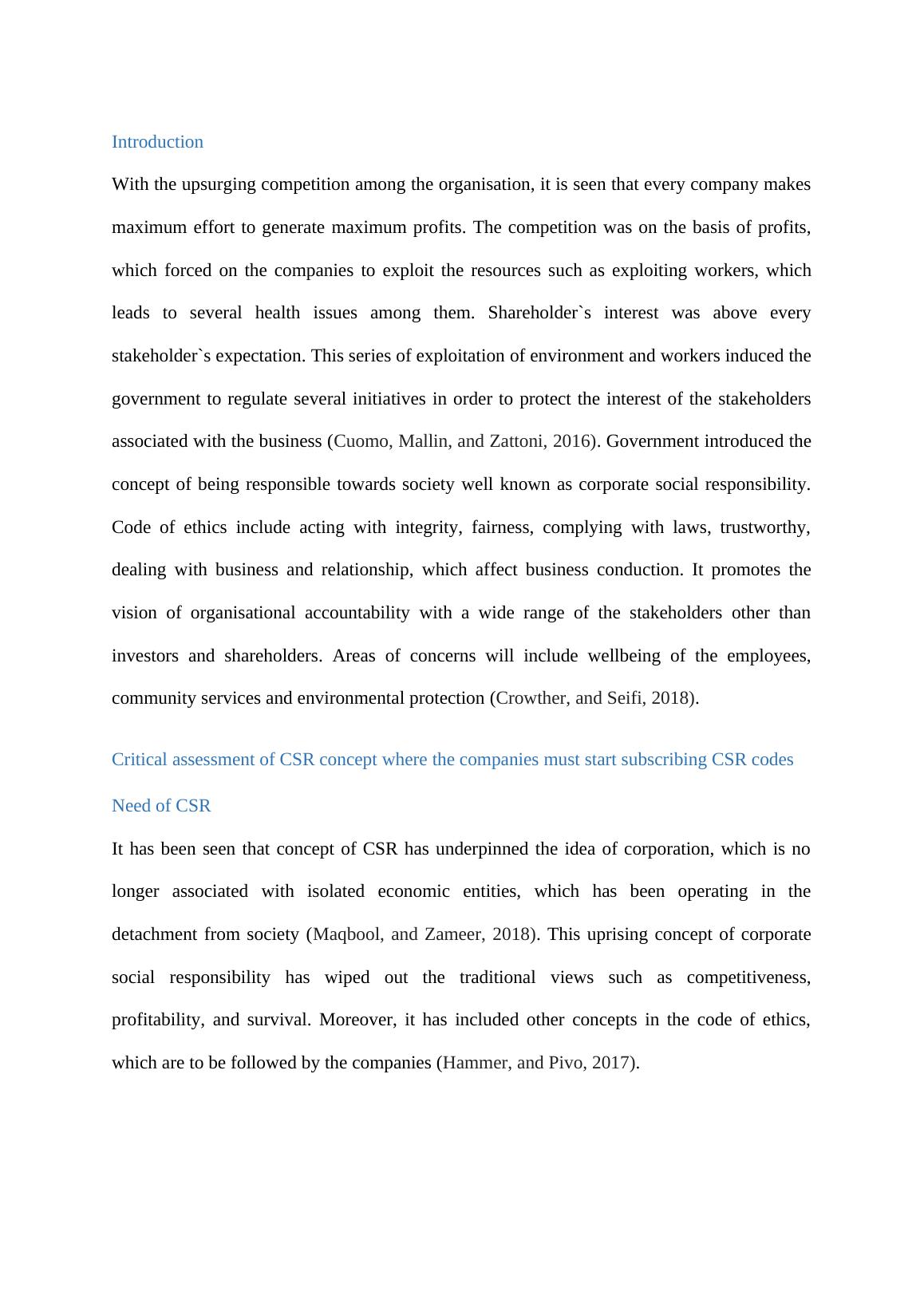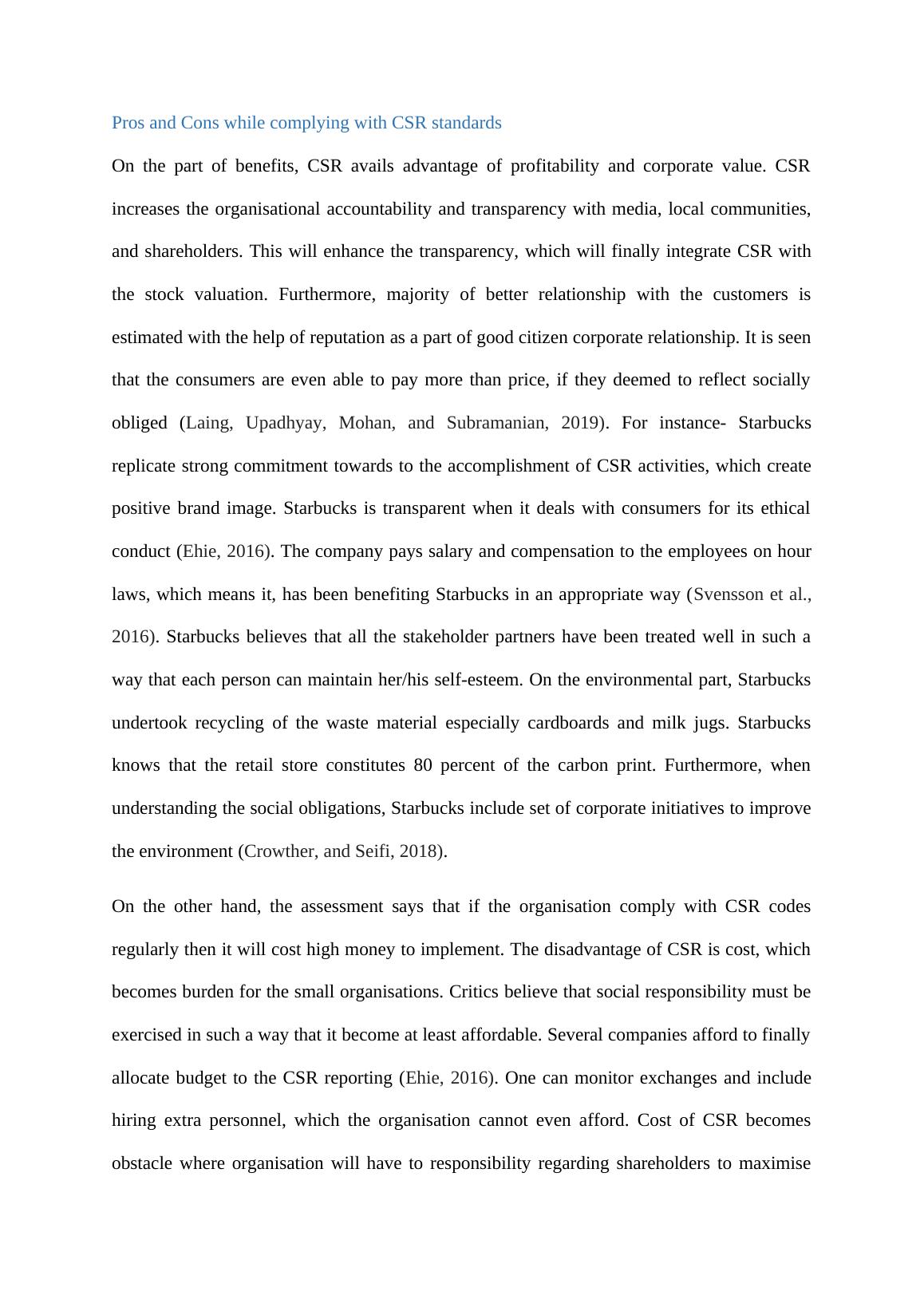Business Ethics - Critical Assessment of CSR Concept
Added on 2022-08-15
13 Pages3589 Words18 Views
BUSINESS ETHICS

Contents
Introduction............................................................................................................... 2
Critical assessment of CSR concept where the companies must start subscribing CSR codes...........2
Need of CSR.......................................................................................................... 2
Pros and Cons while complying with CSR standards.........................................................3
Application of models............................................................................................... 4
Carroll pyramid....................................................................................................... 4
Ethical theories........................................................................................................ 6
Stakeholder approach................................................................................................ 7
Solution to issues that creating non-compliance of Ethical theories........................................8
Conclusion................................................................................................................ 8
References.............................................................................................................. 10
Introduction............................................................................................................... 2
Critical assessment of CSR concept where the companies must start subscribing CSR codes...........2
Need of CSR.......................................................................................................... 2
Pros and Cons while complying with CSR standards.........................................................3
Application of models............................................................................................... 4
Carroll pyramid....................................................................................................... 4
Ethical theories........................................................................................................ 6
Stakeholder approach................................................................................................ 7
Solution to issues that creating non-compliance of Ethical theories........................................8
Conclusion................................................................................................................ 8
References.............................................................................................................. 10

Introduction
With the upsurging competition among the organisation, it is seen that every company makes
maximum effort to generate maximum profits. The competition was on the basis of profits,
which forced on the companies to exploit the resources such as exploiting workers, which
leads to several health issues among them. Shareholder`s interest was above every
stakeholder`s expectation. This series of exploitation of environment and workers induced the
government to regulate several initiatives in order to protect the interest of the stakeholders
associated with the business (Cuomo, Mallin, and Zattoni, 2016). Government introduced the
concept of being responsible towards society well known as corporate social responsibility.
Code of ethics include acting with integrity, fairness, complying with laws, trustworthy,
dealing with business and relationship, which affect business conduction. It promotes the
vision of organisational accountability with a wide range of the stakeholders other than
investors and shareholders. Areas of concerns will include wellbeing of the employees,
community services and environmental protection (Crowther, and Seifi, 2018).
Critical assessment of CSR concept where the companies must start subscribing CSR codes
Need of CSR
It has been seen that concept of CSR has underpinned the idea of corporation, which is no
longer associated with isolated economic entities, which has been operating in the
detachment from society (Maqbool, and Zameer, 2018). This uprising concept of corporate
social responsibility has wiped out the traditional views such as competitiveness,
profitability, and survival. Moreover, it has included other concepts in the code of ethics,
which are to be followed by the companies (Hammer, and Pivo, 2017).
With the upsurging competition among the organisation, it is seen that every company makes
maximum effort to generate maximum profits. The competition was on the basis of profits,
which forced on the companies to exploit the resources such as exploiting workers, which
leads to several health issues among them. Shareholder`s interest was above every
stakeholder`s expectation. This series of exploitation of environment and workers induced the
government to regulate several initiatives in order to protect the interest of the stakeholders
associated with the business (Cuomo, Mallin, and Zattoni, 2016). Government introduced the
concept of being responsible towards society well known as corporate social responsibility.
Code of ethics include acting with integrity, fairness, complying with laws, trustworthy,
dealing with business and relationship, which affect business conduction. It promotes the
vision of organisational accountability with a wide range of the stakeholders other than
investors and shareholders. Areas of concerns will include wellbeing of the employees,
community services and environmental protection (Crowther, and Seifi, 2018).
Critical assessment of CSR concept where the companies must start subscribing CSR codes
Need of CSR
It has been seen that concept of CSR has underpinned the idea of corporation, which is no
longer associated with isolated economic entities, which has been operating in the
detachment from society (Maqbool, and Zameer, 2018). This uprising concept of corporate
social responsibility has wiped out the traditional views such as competitiveness,
profitability, and survival. Moreover, it has included other concepts in the code of ethics,
which are to be followed by the companies (Hammer, and Pivo, 2017).

Pros and Cons while complying with CSR standards
On the part of benefits, CSR avails advantage of profitability and corporate value. CSR
increases the organisational accountability and transparency with media, local communities,
and shareholders. This will enhance the transparency, which will finally integrate CSR with
the stock valuation. Furthermore, majority of better relationship with the customers is
estimated with the help of reputation as a part of good citizen corporate relationship. It is seen
that the consumers are even able to pay more than price, if they deemed to reflect socially
obliged (Laing, Upadhyay, Mohan, and Subramanian, 2019). For instance- Starbucks
replicate strong commitment towards to the accomplishment of CSR activities, which create
positive brand image. Starbucks is transparent when it deals with consumers for its ethical
conduct (Ehie, 2016). The company pays salary and compensation to the employees on hour
laws, which means it, has been benefiting Starbucks in an appropriate way (Svensson et al.,
2016). Starbucks believes that all the stakeholder partners have been treated well in such a
way that each person can maintain her/his self-esteem. On the environmental part, Starbucks
undertook recycling of the waste material especially cardboards and milk jugs. Starbucks
knows that the retail store constitutes 80 percent of the carbon print. Furthermore, when
understanding the social obligations, Starbucks include set of corporate initiatives to improve
the environment (Crowther, and Seifi, 2018).
On the other hand, the assessment says that if the organisation comply with CSR codes
regularly then it will cost high money to implement. The disadvantage of CSR is cost, which
becomes burden for the small organisations. Critics believe that social responsibility must be
exercised in such a way that it become at least affordable. Several companies afford to finally
allocate budget to the CSR reporting (Ehie, 2016). One can monitor exchanges and include
hiring extra personnel, which the organisation cannot even afford. Cost of CSR becomes
obstacle where organisation will have to responsibility regarding shareholders to maximise
On the part of benefits, CSR avails advantage of profitability and corporate value. CSR
increases the organisational accountability and transparency with media, local communities,
and shareholders. This will enhance the transparency, which will finally integrate CSR with
the stock valuation. Furthermore, majority of better relationship with the customers is
estimated with the help of reputation as a part of good citizen corporate relationship. It is seen
that the consumers are even able to pay more than price, if they deemed to reflect socially
obliged (Laing, Upadhyay, Mohan, and Subramanian, 2019). For instance- Starbucks
replicate strong commitment towards to the accomplishment of CSR activities, which create
positive brand image. Starbucks is transparent when it deals with consumers for its ethical
conduct (Ehie, 2016). The company pays salary and compensation to the employees on hour
laws, which means it, has been benefiting Starbucks in an appropriate way (Svensson et al.,
2016). Starbucks believes that all the stakeholder partners have been treated well in such a
way that each person can maintain her/his self-esteem. On the environmental part, Starbucks
undertook recycling of the waste material especially cardboards and milk jugs. Starbucks
knows that the retail store constitutes 80 percent of the carbon print. Furthermore, when
understanding the social obligations, Starbucks include set of corporate initiatives to improve
the environment (Crowther, and Seifi, 2018).
On the other hand, the assessment says that if the organisation comply with CSR codes
regularly then it will cost high money to implement. The disadvantage of CSR is cost, which
becomes burden for the small organisations. Critics believe that social responsibility must be
exercised in such a way that it become at least affordable. Several companies afford to finally
allocate budget to the CSR reporting (Ehie, 2016). One can monitor exchanges and include
hiring extra personnel, which the organisation cannot even afford. Cost of CSR becomes
obstacle where organisation will have to responsibility regarding shareholders to maximise

End of preview
Want to access all the pages? Upload your documents or become a member.
Related Documents
Corporate Social Responsibility of Starbucks: An Ethical Case Studylg...
|9
|2425
|153
Business Ethics: Starbuckslg...
|20
|724
|491
CSR AND VALUE CHANGE OF STARBUCKS CSR and Value Change of Starbuckslg...
|13
|2454
|258
Strategic Management Assignment 2022lg...
|6
|318
|35
Stakeholder Theory Assignment | CSR Assignmentlg...
|10
|2537
|274
Management : Analyse the Effect of Corporate Governance Theorieslg...
|9
|2224
|20
